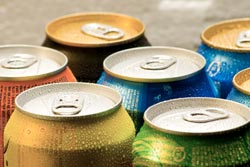6 Things That Happen If You Drink Soda Everyday

Soft drinks or soda date back to 1798 when Joseph Priestley invented carbonated water followed by the invention of cola drinks by pharmacists in the 1800s. Since then, the production of soda has become a multi-billion dollar business as people around the world enjoy drinking them every day. In fact, many will confess they are addicted to drinking soda.
According to research, the average American drinks approximately 56 gallons of soda a year. Many people choose to drink soft drinks over water. Although drinking an occasional soda does not necessarily cause health risks, consuming one to two sodas a day can eventually pose some health problems.

If drinking soda has become a part of your daily routine, you should know about these six health risks:
- Obesity – Over the years as consumption of soda has increased, so has the rise in obesity. Studies show that approximately one in four Americans gets at least 200 calories a day from soda. Surprisingly, 41% of children ages 2 to 11 drink at least one soda or surgery drink per day. That number increases to 62% for adolescents ages 12 to 17. In addition, the average American consumes 22 teaspoons of added sugar every day. That is nearly 400% the daily recommended amount. Unfortunately, just one 20 ounce bottle of soda contains 17 teaspoons of sugar. In fact, Americans consumes an average of fifty gallons of sugar-sweetened sodas a year.
If think you can replace sugary sodas with diet soda to prevent weight gain, you may be mistaken. Studies have shown that sugar-free sodas contain sugar substitutes that sweeten soda at 200 to 600 times the sweetness of sugar. Further, a study published in the 2015 Journal of the American Geriatrics Society found that those who drank diet soda gained almost triple the belly fat as those who didn’t drink diet soda. - Vitamin Deficiency – When carbonated drinks were first invented, they were believed to be healthy, but lab studies have shown carbonated drinks contain phosphoric acid, which can deplete calcium. Soda has also been known to affect vitamin D absorption. Carbonated drinks can be associated with weakening of bones, osteoporosis, as well as hypertension.
Another reason that soda has an effect on calcium and vitamin deficiency is because it has replaced milk. Milk is fortified with vitamin D and calcium, which is needed to maintain strong bones and prevent disease. When milk is replaced with soft drinks, the result can be harmful to development. It can strip bones of calcium needed to help make them strong and avoid fractures. - Dental Decay – Not only can drinking soda and diet soda on a regular basis cause cavities from the high sugar and fructose syrup content, but soda can also cause enamel erosion from the high acidity. Research shows when you drink soda, the sugars interact with the bacteria in your mouth and form acid. The acid will then attack your teeth causing erosion. In addition, both regular and sugar-free sodas contain acids, which can work to erode your teeth as well. Your teeth can end up under constant attack from consuming soda on a regular basis.
- Chronic Health Diseases – According to the US Framingham Heart Study, drinking one can of soda has not only been linked to obesity, but also an increased risk of metabolic syndrome, impaired sugar levels, increased waist size, high blood pressure and higher cholesterol levels, which can increase the risk of heart attack. Further, the US Nurses Health Study II revealed that women who consumed one or more soft drinks per day had an increased risk of developing type 2 diabetes. Likewise, both studies established drinking approximately one can of soda per day could also lead to the development of chronic cardiovascular disease and high blood pressure.
- Caffeine Addiction – Soft drinks that contain caffeine have the largest corner of the beverage industry in the world. Studies have shown that caffeine is addictive, whether it’s through tea, coffee, chocolate or soda. The level of caffeine contained in soft drinks ranges from 40 to 50 mg per can, which is about the same as a cup of coffee. Did you know soda is the main source of caffeine in the diet of children?
Although many adults drink soft drinks for the energy they feel from caffeine, it can also contribute to several negative side effects including the development of kidney stones. In children, caffeine can cause disturbed sleep patterns, bedwetting and anxiety. The withdrawal symptoms in adult and children can be unfavorable as well. These symptoms can include headaches, fatigue, decreased alertness, depressed mood and irritability. - Cancer – The presence of Benzene, which is a chemical known to cause cancer, can be found in soft drinks and even the water we drink. However, the benzoic acid found in soda is not as strictly regulated as the levels found in drinking water. Benzene is formed when benzoic acid comes in contact with ascorbic acid and metals like iron or copper. It can subsequently cause a chemical reaction to form the cancer-causing chemical, Benzene.
Although The Food and Drug Administration believe the levels of benzene found in soda have been tested and should not be a cause for alarm, many companies may not devote the time and effort to monitor the levels. Therefore, most strict recommendations indicate that you should not drink more than one can of soda a week.
You might also be interested in...
-
 6 Things That Happen If You Drink Soda Everyday
6 Things That Happen If You Drink Soda Everyday
-
 8 Survival Skills Every Child Should Know
8 Survival Skills Every Child Should Know
-
 Children's Whole Life Insurance: Financial Benefits
Children's Whole Life Insurance: Financial Benefits
-
 Coparenting With An Ex
Coparenting With An Ex
-
 Dealing With A Teenage Daughter
Dealing With A Teenage Daughter
-
 Do Stay At Home Moms Need Life Insurance
Do Stay At Home Moms Need Life Insurance
-
 Four Effortless Ways to Be a Better Parent
Four Effortless Ways to Be a Better Parent
-
 Give Your Child a Financial Head Start
Give Your Child a Financial Head Start
-
 Top 5 Ways To Help Your Child Adjust To A New School
Top 5 Ways To Help Your Child Adjust To A New School
-
 How to Have a Successful Parent/Teacher Conference
How to Have a Successful Parent/Teacher Conference
-
 Keep Your Children Safe and Happy at Home
Keep Your Children Safe and Happy at Home
-
 Should You Get Life Insurance for Your Children
Should You Get Life Insurance for Your Children
-
 Should You Monitor Your Kids’ Online Activity?
Should You Monitor Your Kids’ Online Activity?
-
 Surprising Things New Parents Should Know
Surprising Things New Parents Should Know
-
 Teaching an Older Sibling to Help Care for a Younger One
Teaching an Older Sibling to Help Care for a Younger One
-
 Teaching Your Child Responsibility
Teaching Your Child Responsibility
-
 The Importance of Whole Life Insurance
The Importance of Whole Life Insurance
-
 9 Life Hacks For Busy Moms
9 Life Hacks For Busy Moms
-
 Why Adults Need A Timeout Too
Why Adults Need A Timeout Too
-
 New Tools To Keep Teen Drivers Safe
New Tools To Keep Teen Drivers Safe
-
 Sneaky Ways To Trick Picky Eaters
Sneaky Ways To Trick Picky Eaters
-
 Dad Wisdom You Can’t Live Without
Dad Wisdom You Can’t Live Without
-
 What Parents Should Know About Snapchat
What Parents Should Know About Snapchat
-
 Top 12 Most Nutritious Food List
Top 12 Most Nutritious Food List
-
 How Bullying Damages A Child’s Health
How Bullying Damages A Child’s Health
-
 7 Tips for Balancing Life as a Working Single Parent
7 Tips for Balancing Life as a Working Single Parent
-
 9 Tips on Digital Devices for Parents and Kids
9 Tips on Digital Devices for Parents and Kids
-
 How To Choose The Right Daycare
How To Choose The Right Daycare
-
 Halloween Safety Every Parent Should Know
Halloween Safety Every Parent Should Know
-
 The Pros and Cons of Juvenile Life Insurance
The Pros and Cons of Juvenile Life Insurance
-
 Options for Getting Life Insurance for a Minor with a Pre-existing Condition
Options for Getting Life Insurance for a Minor with a Pre-existing Condition
-
 Pregnancy and Life Insurance: What you need to know about getting coverage
Pregnancy and Life Insurance: What you need to know about getting coverage
-
 Life Insurance on Children: What You Need to Know
Life Insurance on Children: What You Need to Know

 Insurance products are available in New York from
Insurance products are available in New York from  Insurance products are available in your state from
Insurance products are available in your state from 






































